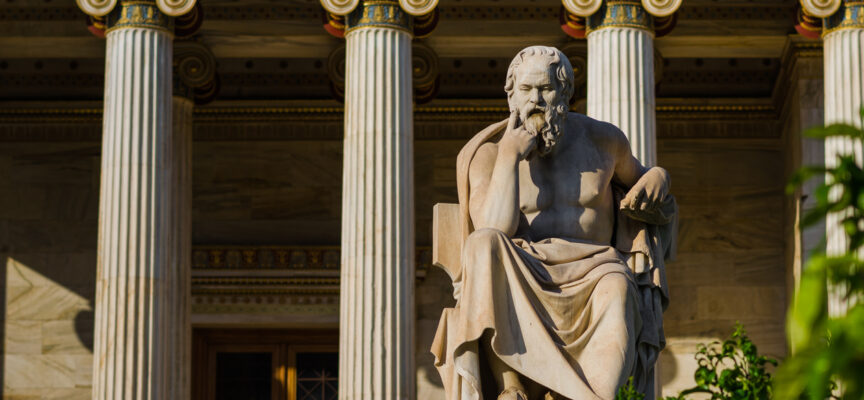It has been said, famously, that all Western philosophy is “footnotes to Plato.” And, while this statement rings true, the deeper and more salient observation is that much of Western philosophy is footnotes to Lucifer.
Indeed. At the Fall, the Evil One spoke a word against God’s word, calling into question the truth of God’s word, the goodness of his created order, and the righteousness of his character. Lucifer’s destructive word can be viewed as his “antithesis” for the world. In the modern world, the Evil One’s antithesis has been active—and nowhere more than Western philosophy departments.
Thus, in recognition of Lucifer’s antithetical word, this article “calls out” the seven most destructive philosophers in Western history.
Plato (4th century B.C.)
Plato is perhaps the greatest philosopher in Western history, yet a number of his conclusions are severely problematic. Especially troublesome is his denigration of the material world in general and the human body in particular. Plato believed that the visible world is inferior to the invisible, and that knowledge gained from the visible world is therefore deceptive. In other words, he was a philosopher of hyperrationality, of the otherworldly, who denigrated God’s good creation. Sadly, this Platonic impulse has a rich history of appropriation in subsequent philosophy, and even in Western cultural developments such as transgender ideology and humanism.
Machiavelli (1469-1527)
Niccolo Machiavelli was an early modern Italian politico-turned-philosopher. As his political career collapsed, he penned The Prince, arguing that Christian morality is detrimental to good government and that political leaders should therefore operate as secular pragmatists. He believed that a political leader should sometimes be cruel, although the cruelty should be administered quickly, so as to get it over with, where has the leader’s acts of kindness should be meted slowly over time so that he will always be seen as generous. He further advises leaders to lie and break their promises. Many later political leaders—including Cardinal Richelieu (France), Frederick the Great (Prussia), Bismarck (Germany), Mussolini (Italy), Lenin and Stalin (Russia), and Hitler (Germany)—embraced his ideas and put them into action.
Hobbes (1588-1679)
English philosopher Thomas Hobbes believed that physical matter is all there is, and that therefore human beings are merely particles in motion. He further believed that “society” is merely an aggregate of violent political animals who need to be kept in check via a powerful sovereign body. Thus emphasizing the importance of sovereign political bodies, Hobbes argued in effect that the nation-state should replace the church as society’s central instituion. In fact, the first edition of Leviathan had a cover image that portrayed Leviathan’s torso as being composed of hundreds of people facing him; the image is intended to mimic the view from a cathedral in which one would see people facing toward Christ. Moreover, Hobbes viewed the nation state as being similar to a mafia protection racket—the state offers itself as our redemption, especially from wars of religion. Sadly, many of history’s tyrants—such as Lenin and Stalin—exhibited a Hobbesian metaphysic and anthropology.
Descartes (1596-1650)
Known as the father of modernity, French philosopher Rene Descartes considered autonomous reason to be the final arbiter of truth, and posited methodological doubt as the foundation upon which humanity could build a solid structure of knowledge. Like Plato, his hyperrationality was otherworldly, denigrating the value of the material world in general and the human body in particular. And, like Plato, his conclusions foreshadow contemporary movements—such as transgenderism and transhumanism—that undermine God’s affirmation of the created world and his employment of creational design to guide our knowing and living.
Marx (1818-1883)
German thinker Karl Marx set forth a secular ideology whose critique of society is inherently totalizing (intruding on every sphere of culture) and radical (seeking to reconstruct from the roots up). Marxism provides a comprehensive worldview and promises an immanent system of salvation. It’s “god” is material equality and its “evil” is material inequality. Its salvation is found in Marxist ideology and revolution, its priesthood in the Communist party, its ethic in the relentless drive to achieve a classless society, and its eschatology in a Communist utopia that causes evil to disappear. In reality, everywhere Marxism has been tried, it has been dystopian rather than utopian, inducing poverty and suppressing societies across the globe. Yet, ironically, it remains the “opium” of many intellectuals and is right now a re-emerging contender in American politics and culture. His global influence is surpassed only by Jesus, Buddha, Muhammad, and perhaps Freud.
Comte (1798-1857)
Auguste Comte (1798-1857) was a French philosopher who believed that human beings are intrinsically good but perverted by corrupt cultural institutions and national political arrangements. He endeavored to establish an atheistic religion that would undermine strong forms of religion and strong forms of the nation-state. With traditional religion and the nation-state thus weakened, wars and tensions would cease. A borderless and pacifistic utopia would ensue. Comte sought to achieve an immanent salvation in which the Christian doctrine of love could be reduced to an abstract humanitarian posture toward human beings in general. With love and virtue stripped of any divine reference point, the soil would be tilled for global unity and goodwill.
Foucault (1926-1984)
French philosopher Michel Foucault drew upon Nietzsche and Marx to build an atheistic and anti-realist view of the world. From Nietzsche, he adopted the view that power is at the center of all political discourse, and further argued that knowledge is merely a means to manipulate and exercise power. Thus, words such as “insane,” “prisoner,” and “homosexual” are manipulative labels that Western society uses to ostracize certain persons. Foucault further believed that human beings do not have an essence but instead we are constructed by systems and networks of power. Foucault’s work is precursor to critical race theory, queer theory, and intersectionality.
Footnotes to Lucifer
In attempting to keep this list on the nearside of unwieldy, any number of other ideological hors-la-loi—including Descartes, Kant, Hegel, Schopenhauer, Nietzsche, and Gramsci –have been omitted. Yet, the list suffices to remind us that Lucifer’s antithetical word holds sway in many of the ideologies and movements that continue to degrade the Western mind.
The Christian gospel is an announcement in which God reasserts his claim on every individual, society, and cultural institution. It announces that, through the risen Christ, God offers salvation from sin to those persons who will embrace him in faith; that, from those persons who embrace him, God is creating a people—the Church—who will be a light to the nations; and that, one day, Christ will return to restore his good creation, cleansing it of sin and its effects, and instituting a reign in which justice will roll down like the water and God’s creation will again flourish as he intended. In various ways, the destructive philosophers on our list undermine the Christian gospel.
Thus, in the meantime, in this era between Christ’s ascension and soon return, God calls his people—including his philosophers and theologians—to “share” the gospel by theorizing in conformity with his creational word and as a preview of his coming kingdom.
Subscribe
Never miss a post! Have all new posts delivered straight to your inbox.








Dr. Ashford, thank you for your columns. The Aquila Report (PCA, OPC and other Reformed groups related) has “republished” several of your columns–linked to your personal site. I have appreciated each one I have read.
Given this, I do want to offer a correction, or maybe a request for more “nuance” maybe in your argument. I agree with the general thrust of the argument and the claims you make here except for the broad strokes used to paint Plato. I teach some of Plato’s works (my doctorate is in Rhetorical theory) and I have studied other Christian scholars who critique Plato and I find your claim to be too broad and actually more accurate about Neo-Platonist thinking and not Plato.
In your column you repeat the broad-stroke critique of Plato the Neo-Calvinists (whom I love and follow because of my Reformed theology commitments) like Kuyper and Francis Schaeffer (who repeats what he learned from Van Til). If you were to read some of Dooyeweerd’s critique of Plato (he actually quotes books and sections unlike the others) then this “Plato is against the material world and against the body” is significantly nuanced. Note, also that people like Craig Carter’s books (the Great Tradition) admits this general claim against Plato has to be attributed, more truthfully, against Plotinus and the Neo-Platonists and not Plato. Similarly, you will find the scholarship of Lloyd Gerson (a Roman Catholic, admittedly) and the older Etienne Gilson both tend to correct the differences between Plato and the neoPlatonists.
Please understand I am no apologist for Plato. He was, as far as I can tell, an unregenerate pagan who will not be in heaven. He makes lots of incorrect assumptions and conclusions. He was appropriately critiqued by Augustine in The City of God and Plato, too, is a footnote to Lucifer. However, as Augustine argues in On Christian Doctrine, book II, (and repeated by one of your fellow Baptists, Louis Marks) we should read the pagans because God has, through his common grace and God’s created nature, revealed some truths to them. We need to always test what anyone says by the Word of God, but we can read and benefit from them. I assume the same is true about people such as Foucault, Nietzsche, Marx, Gramsci, Wittgenstein (for your dissertations) and others, but I admit I find it harder to be as gracious to them as I am towards Plato.
Again, thank you for your thoughtful columns and your work among our Baptist brothers and sisters. For Christ’s Crown and Kingdom,
Mark Gring